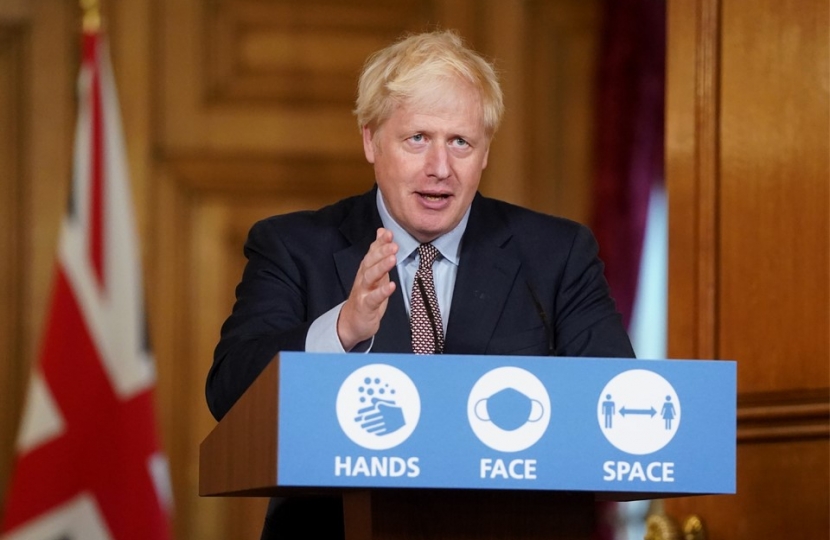
Today, the Prime Minister updated the public on the results from the Pfizer/BioNTec Vaccine. The Pfizer/BioNTech Vaccine has been tested on over 40,000 volunteers and interim results suggest it is proving 90 per cent effective at protecting people against the virus.
While we are optimistic of a breakthrough, we must remember that there are no guarantees. The vaccine needs to pass all the rigorous safety checks and needs to be proved effective. If and when this vaccine is approved, we will begin a UK-wide NHS led programme of vaccine distribution. This will start with those most at risk, as currently recommended by scientific experts, before being rolled out more widely.
Earlier this year the UK Government ordered 40 million doses of the Pfizer vaccine – enough for about a third of the population, since you need two doses each. That puts us towards the front of the international pack on a per capita basis. We have also ordered over 300 million doses from 5 other vaccine candidates as well.
Irrespective of whether there is a vaccine on the way or not, we must continue to do everything possible right now to bring the R down – and everyone should continue to stay at home, to protect the NHS and save lives.
Rapid-turnaround Tests
We have announced the rollout of 600,000 rapid-turnaround tests across England, so that we can detect this virus quicker than ever before – even in people who don’t have symptoms – and mass testing will be a vital tool in defeating coronavirus.
This innovative new technology that can provide results within an hour without needing to be processed in a lab. 600,000 more of these rapid-turnaround tests will be sent out by NHS Test and Trace to local public health leaders this week in over 50 areas. Each area will receive an initial batch of 10,000 tests as part of a new pilot to enable them to start testing priority and high-risk groups.
Proactively testing asymptomatic individuals will help identify those who unknowingly have the virus and enable those who test positive and their contacts to self-isolate, which can help drive down the R rate locally and save lives.
The Prime Minister's full statement...
“Across the country and around the world this evening,
people are asking one question about our fight against Covid,
does the news of progress towards a vaccine – that’s been announced today - mean we are at the beginning of the end of our troubles?
So, let me set out our assessment.
The Pfizer/BioNTech Vaccine has been tested on over 40,000 volunteers and interim results suggest it is proving 90 per cent effective at protecting people against the virus.
But we haven’t yet seen the full safety data, and these findings also need to be peer-reviewed.
So we have cleared one significant hurdle but there are several more to go before we know the vaccine can be used.
What I can say is that if and when this vaccine is approved, we, in this country, will be ready to start using it.
Earlier this year the UK Government ordered 40 million doses of the Pfizer vaccine – enough for about a third of the population, since you need two doses each.
That puts us towards the front of the international pack on a per capita basis – and I should add we’ve ordered over 300 million doses from 5 other vaccine candidates as well.
If the Pfizer vaccine passes all the rigorous safety checks and is proved to be effective then we will begin a UK-wide NHS led programme of vaccine distribution.
We will decide the order in which people are offered the vaccination taking account of recommendations from a group of scientific experts, the Joint Committee on Vaccination and Immunisation.
They’re looking at a range of factors, including the different characteristics of different types of vaccines, to work out the most effective way to protect as many people as possible and save as many lives as we can.
And we will be setting out more detail about that in due course.
But – and you know I am going to say this -
I must stress, these are very, very early days.
We have talked for a long time, or I have, about the distant bugle of the scientific cavalry coming over the brow of the hill
And tonight that toot of the bugle is louder.
But it is still some way off.
And we absolutely cannot rely on this as a solution.
The biggest mistake we could make now would be to slacken our resolve at such a critical moment.
On Friday, SAGE reported that the R is above 1 in England – though this does not take into account the current national restrictions.
Alas, the death figures are tragically rising, running at an average of over 300 a day – sadly double where they were 24 days ago
The number of Covid patients in hospital has risen from just over 10,000 two weeks ago to nearly 13,000 on 5 November, and we are heading towards the levels of the previous peak.
Irrespective of whether there is a vaccine on the way or not, we must continue to do everything possible right now to bring the R down.
And that is why we hope and believe that mass testing will help.
Our first pilot began in Liverpool on Friday, in partnership with Liverpool City Council.
We’ve tested thousands of people there but there are still a lot more to do, so please if you are in Liverpool, get yourself along to a testing centre – there are 19 at the moment with more still to come.
The more people get tested the better we can protect that great city, and drive the disease down in Liverpool, so do it for your friends, for your relatives, for your community.
And I want to thank the fantastic support of the army, the people of Liverpool and Liverpool City Council.
And we are now going further by sending out hundreds of thousands of rapid lateral flow tests to local authorities right across England - and also of course to the Devolved Administrations.
We’re also working with universities to establish, as soon as possible, similar mass testing capacity for students up and down the country.
But while we are making progress this project is still in its infancy.
And neither mass testing nor progress on vaccines – both vital arrows in our epidemiological quiver, both key parts of our fight against Covid - are at the present time a substitute for the national restrictions, for social distancing, for hand hygiene and all the rest.
So it is all the more important to follow the rules.
I know it’s been a tough first weekend of these Autumn restrictions
and I’m especially grateful to the Royal British Legion and all those who worked so hard to ensure that no virus would stop us yesterday from honouring the memory of those who gave their lives for our freedom.
But we must get through this to 2nd December, when these measures expire and we plan to move forward with a tiered approach.
Remember the basics, hands, face, space, and the follow the rules, that is how we can together protect our NHS, save lives and get this virus back in its box.
And that is what we will do.”
